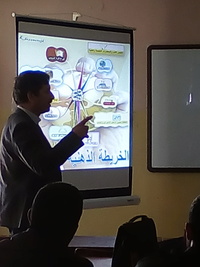freeman
المـديـر العـــام


عدد المساهمات : 19313
تاريخ التسجيل : 05/01/2011
العمر : 64
الموقع : http://sixhats.jimdo.com/
 |  موضوع: MIT BRAINPOWER Leading a new era in neuroscience موضوع: MIT BRAINPOWER Leading a new era in neuroscience  الإثنين مارس 03, 2014 11:24 pm الإثنين مارس 03, 2014 11:24 pm | |
|  Neuroscience stands on the brink of major new breakthroughs — including treatment for brain disorders from Alzheimer’s to autism — and MIT is leading the way.
“MIT is particularly well positioned to tackle deep questions about the brain and mind,” says Mriganka Sur, who, as the head of the Department of Brain and Cognitive Sciences, presides over a scientific complex that combines the Department, the McGovern Institute for Brain Research, and the Picower Center for Learning and Memory in a single building. Together, they comprise perhaps the most advanced brain research center in the world.
How does the brain create the mind?
Since neuroscience emerged as a discipline a scant few decades ago, it has transported this question from the realm of philosophy to that of scientific inquiry, making rapid progress toward finding answers. The evolution of related fields, including molecular biology and genetics, cognitive psychology, and artificial intelligence, have propelled neuroscientific discovery. So have recent technologies that reveal and manipulate brain function at a stunning level of detail.
MIT’s examination of the brain and mind is unique, says Sur, because of “its uncompromising focus on the underlying concepts of brain function — on linking molecular- and network-level mechanisms to cognitive mechanisms. This approach derives from our history and from our way of doing science, and it allows us to ask the fundamental questions that we believe are critical to understanding brain disorders.”
From that intellectual platform, Sur and his colleagues have embarked on an ambitious quest to untangle the complex genetic and developmental mechanisms behind the cognitive and social communication deficits of autism. This effort recently yielded breakthroughs enabling potentially transformative therapeutics for two subsets of autism — fragile X syndrome and Rett syndrome — which will soon enter clinical trials. Ongoing research, meanwhile, is shedding light on other neuropsychiatric conditions, such as schizophrenia and bipolar disorder, and degenerative diseases, such as Alzheimer’s and Parkinson’s disease.
MIT also just launched the Intelligence Initiative, an unparalleled collaboration between world-class cognitive scientists and artificial intelligence experts to explore the questions of what exactly intelligence is, and how it works. They hope not only to create computational models of human learning, but to use those models to design smarter machines.
One measure of the excitement around neuroscience is the fact that researchers have gravitated toward the field from areas as diverse as psychology, engineering, physics, molecular biology, and chemistry. “Neuroscience is a young field. It’s only in the last few years that we have been hiring faculty who have been trained in neuroscience programs,” says Sur, whose own background in electrical engineering helped him understand brain circuitry. “I’ve become a neuroscientist because the questions lie in neuroscience. You have to go where the questions take you.” by Lauren Clark
ْ
________*التــَّـوْقـْـيـعُ*_________
لا أحد يظن أن العظماء تعساء إلا العظماء أنفسهم. إدوارد ينج: شاعر إنجليزي
| |
|
